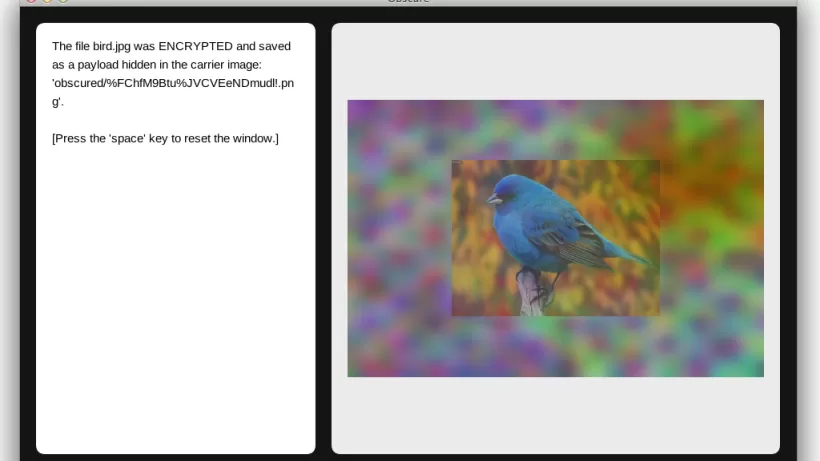An application for privacy ...
In a world where it seems there is no longer any privacy, we have no alternative but to build that privacy for ourselves. Obscure, a steganography application (application decommissioned for Obsolescence), is a demonstration of how one might attempt to implement a renewal of privacy through creation rather than by dint of right and law. Governments and corporations alike have steadily eroded the viability of the later construct. Documents like the the U.S. Bill of Rights seem all but moot. The recent revelations by Snowden via Greenwald and Poitras of the pervasive and worldwide apparatus of NSA surveillance underline that we are all subject to this intrusive government activity, and that there will likely be no easy or quick return of any expectation of privacy for anyone.
Nihil sapientiae odiosius acumine nimio.
— Poe claimed it was Seneca who said "Nothing is more hateful to wisdom than excessive cleverness."
The lesson of The Purloined Letter is that what is commonly overlooked is what was hidden in plain sight.
We must live the life of the paranoid now. The prescience of Foucault's theory of the panoptic gaze has followed us doggedly into the era of the control society. Lest we behave always as if we are ashamed, we must learn to clothe our thoughts and our communications in envelopes that resist the forcible transparencies of the corporate/state apparatuses. It is hard to imagine that real thinking, real communication, real art, or real politics can possibly be sustained by anyone subject to the harsh scopic intensities of the naked and caged.
In our situation, we should recognize the cultural shadow of that set of material practices that conspire to rob people of human agency: i.e., not just surveillance but imprisonment. We have been made to watch idly the vicious incarceration and torture of innocents made out to be enemies. Now we are witness to the carceral character of our own circumstances—that which we had taken for freedom.
What seems least understood by most of us, is not only the nature of our situation—politically, in terms of the state, the economy, etc.— but also the nature of the technological determinations of our cultural life. This is certainly at stake in the NSA controversies: the very functioning of the internet infrastructure enables both our communication and the unprecedented surveillance. The potential for a technology that had been for a long time been lauded as democratizing, to be turned so quickly into the very mechanism of mass surveillance and suppression, is lesson in the folly of the naive technophilia so heavily promoted by corporatist and progressive agendas alike. In so far as this project addresses the technical, it leverages the ontology of the digital image in order to do its work; these are pixel level manipulations that encode the hidden payload.
But why must we be able to hide? The prohibitions on unreasonable search and seizure might reasonably be searched for within the doctrines of possession inside the ideological fortress of the bourgeoisie. It is not really some edenic fall and its attendant shame which makes hiding a right or a need. Ultimately its the uses of unhiding that makes it a particular and intolerable indignity. Specifically, it is to crush or capture the dissident in us. Surveillance is a cancerous node on that vector that ends at the gulag. It is that which makes the space surrounding the prison just as unfree. The tense divide between dignity and humiliation is no bright line but a diffusion of confected criminality that permeates contemporary life and makes thinking a felony.
Thinking itself leans hard on hiding. Thinking makes things into what they are not. The protean potentiality of mind smuggles meaning inside the most unlikely things. Without figuration, the mind is a desert. But every lowly creature of the sand dune carries a story and on its back and a metaphor in its belly. Every rock, and every grain can be read.
Steganography literalizes figuration by making an image into something else too. That picture of the young Manning hides the sorrows of 35 years—not unlike Dorian Grey. That image of Manning might also encode the very secrets he revealed to us, the misdeeds of our government: torture, murder and deception.
Various revelations have infuriated our would be masters; they really cannot tolerate exposure. The monopoly on secrecy, like the monopoly on violence is about power and control; the truth threatens the stability of the regime, if, that is, the people will withdraw their consent as a result. The maintenance of the current system depends on these monopolies. What threatens the US government—all authoritarian state powers—is exposure of their hypocrisy. Although, sadly, it seems that between the inculcation of a deadening ideological blindness and the hypertrophy of police powers, the power of exposure is on the wane.
What we are losing too, perhaps, is the dignity of the telling—where consent and conviviality are the context of a communing in language. Instead, we get force and deceit as the basis for unconsenting transmissions. There will be no waiting for a messenger to volunteer its report. There will be torture and threats until passwords are given up and dead boxes will spit out what is demanded.
So now, we turn our attention to the techniques of hiding in plain sight.
